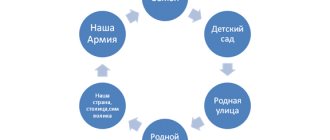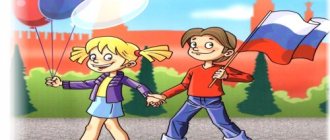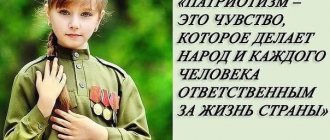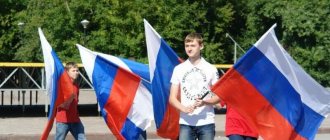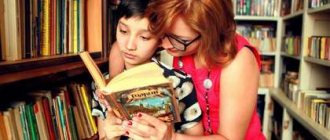Patriotic education of preschool children through fiction
Domareva Irina Nikolaevna head Petrovskaya Albina Valentinovna senior teacher Kochkina Tamara Ivanovna Sidelnikova Tatyana Anatolyevna educators MBDOU DS No. 61 “Semitsvetik” Stary Oskol city district
Patriotic education of children is one of the main tasks of a preschool institution. The feeling of patriotism is multifaceted in content. This includes love for one’s native places, pride in one’s people, a sense of one’s inseparability with the outside world, and a desire to preserve and increase the wealth of one’s country.
Patriotic education of a child is a complex pedagogical process. It is based on the development of moral feelings. A child’s sense of homeland begins with his relationship to his family, to those closest to him: mother, father, grandmother, grandfather. The feeling of the Motherland begins with admiration for what the baby sees in front of him, what he rejoices at and what evokes a response in his soul. And although many impressions have not yet been deeply realized by him, when passed through childhood perception, they play a huge role in the formation of the personality of a patriot.
In older preschool age, children become more and more familiar with books as a source of information about the world. The book - as a symbol of knowledge, joy, pleasure - is familiar to students from early childhood. But it is precisely in older preschool age that she becomes an integral companion in instilling in children a love for their fatherland.
Books containing proverbs, sayings, fairy tales, etc. are of constant interest to preschoolers. Oral folk art is the richest material for patriotic education. Russian folk fairy tales, full of wonderful fiction, dramatic situations, confrontation between good and evil, not only entertain and delight children, but also lay the foundations of morality.
A special ancient genre of oral folk art, with which we introduce pupils in senior preschool age, are epics. The content of epics is rich in examples for patriotic education. (After reading epics, children show great interest in Russian heroes: they look at illustrations, reproductions of paintings, draw heroes, sculpt them from plasticine, imitate them in games).
Advertising message
In addition to folk heroes, pupils are aroused by stories about various professions, especially those with which they were not yet familiar in their everyday lives - polar explorers, travelers, scientists, military men, firefighters, astronauts. Knowledge about various opportunities to show their courage and heroism in everyday life inspires preschoolers, instills in them the desire to master a “heroic” profession, to serve people and the Fatherland. Preschoolers are born with the desire to be pilots, astronauts, and military personnel.
Poems about the Great Patriotic War are one of the most important components of patriotic education. Poems by S. Mikhalkov, S. Vasiliev, A. Tvardovsky, A. Barto about the exploits and courage of soldiers and partisans who defended the Motherland and who did not spare themselves in the struggle are a highly artistic means of influencing the consciousness of a child.
Stories about the Great Patriotic War, about children and teenagers who participated in the fight against the invaders, introduce modern children to the exploits of their great-grandparents. Children empathize with the characters of A. Gaidar, L. Kassil, A. Mityaev, are worried, for the first time realize the cruelty and mercilessness of war, are indignant against fascism, attacks on civilians, and receive the first knowledge about the equality of all races and nationalities.
Stories about the hometown of Stary Oskol are a separate type of special children's literature for the patriotic education of preschoolers. The poems used here are by L. Pichinevka “The most beautiful city of Stary Oskol”, E. Syrovatskaya “Stary Oskol”, B. Shamraev “Stary Oskol. Hymn to the city”, etc. As a rule, such books are brightly illustrated and contain material suitable for children's perception.
The main form of using literature in instilling patriotism in older preschoolers is a specially organized lesson. As part of their familiarization with the surrounding world, nature, and literature, preschoolers listen to various works, talk with the teacher, tell their impressions, memorize and retell.
In addition to direct educational activities, literary works are given to preschoolers in many other forms. Children very readily perceive stories played out using tabletop and glove theaters. Based on familiar fairy tales and stories, it is necessary to organize dramatizations - performances, dramatizations based on well-known (or just read) works. By experiencing the plot from the first person, the child understands more deeply the motives of the character’s actions and absorbs the ways of behavior.
The educational power of fiction is aimed at forming in preschoolers the image of a hero, a defender of their state, cultivating a sense of pride in the history of the country’s formation and the need to defend the Motherland, developing a desire to be a defender of the land on which he was born and raised, which was cherished by his ancestors like the apple of his eye. Examples of heroic deeds of the main characters of literary works contribute to the understanding that all great deeds and courageous deeds are performed out of love for the Fatherland and their loved ones, for their people, out of a sense of responsibility towards them.
To consolidate the impressions of what they read, as well as to monitor children’s assimilation of the material, students are given the opportunity to creatively express impressions through art activities, design, and modeling. The teacher can organize free dramatization, construction or role-playing games with preschoolers. The interest of the pupils or the productivity of their activities shows how interesting the work of art was for the children, how accessible and convincing the teacher conveyed the feelings and events expressed in it, how much the image of a national hero, a responsible citizen is formed in preschoolers, how close and understandable to them are the phenomena of their native culture, plots of fairy tales, works of art in general. The tasks of patriotic education are solved comprehensively, but fiction occupies one of the main places in the formation of the personality of a young citizen of our Motherland.
Bibliography:
- Raising children in the traditions of folk culture / Vataman V.P., Volgograd, 2008.
- Raising children in the traditions of Russian culture / Lunina G.V., – M., 2005.
- For preschoolers about defenders of the fatherland / Under. ed. Kondrykinskaya L.A. – M., 2006.
- Spiritual and moral education through the means of author’s fairy tales / Korotkova L. D., – M., 2006.
- Play activities in kindergarten / Gubanova N. F., M., – 2006.
- How to teach children to love their homeland / Antonov Yu. E., Levina L. V., Rozova O. V. et al. - M., 2005.
- Patriotic education of children 4 – 6 years old / Komratova N. G., Gribova L. F., – M., 2007.
- Patriotic education of preschool children / Aleshina N.V. - M., 2008.
- Introducing children to fiction / Gerbova V.V., M., – 2006.
- Education and training program in kindergarten / Ed. Vasilyeva M. A., Gerbova V. V., Komarova T. S. - M., 2004.
Article “Fiction as a means of instilling patriotic feelings in primary schoolchildren”
Fiction as a means of instilling patriotic feelings in primary schoolchildren.
Primary school is one of the stages of long and painstaking work to instill citizenship and patriotism in students.
This topic is relevant and significant in our time, since the future of our country depends on the younger generation and we, teachers, are faced with the difficult task of forming in every child all the necessary qualities that will create a stable foundation for personal development, and finding new guidelines for children to follow. , new methods of influencing the consciousness and feelings of modern schoolchildren.
Love for the Motherland, or patriotism (Greek πατριώτης - compatriot, πατρίς fatherland) is a moral and political principle, a social feeling, the content of which is love for the fatherland and the willingness to subordinate one’s private interests to its interests.
In the dictionary of S.I. Ozhegov gives the following definition: “A patriot is a person imbued with patriotism; devoted to the interests of some cause..."; “patriotism is devotion and love for one’s fatherland and one’s people” [19, p. 377].
In the explanatory dictionary V.I. Dahl interprets the meaning of this word as follows: “A patriot is a lover of the Fatherland, a zealot for its good, a lover of the fatherland, a patriot or fatherlander; and patriotism is love for the fatherland” [8, p. 476].
Patriotism as a personality quality is formed and developed in the process of patriotic education. Patriotic education of junior schoolchildren is one of the main tasks of an educational institution. This is a complex pedagogical process, which is based on the development of certain moral feelings and qualities.
Patriotic education of children of primary school age is a purposeful process of pedagogical influence on the child’s personality in order to enrich his knowledge about the Motherland, foster patriotic feelings, develop skills of moral behavior, and develop the need for activities for the common benefit.
Literary reading lessons play a big role in the patriotic education of younger schoolchildren, because It is in them that the problems of duty and personal responsibility for the fate of the fatherland, the world, the problems of moral choice and patriotic memory that concern the modern reader converge. It is works of art that make it possible to awaken pride, admiration and a sense of national dignity in students, and contribute to the development of a sense of patriotism.
Over the long centuries of our heroic history, our people have created many works of art, such as fairy tales, legends, riddles, songs, proverbs and sayings. These works have absorbed the wisdom and experience of generations of the Russian people. Their study is subordinated to instilling respect and pride for one’s people, cultivating high patriotic and civic feelings. Studying the folklore of their ancestors, many teachers point out that the soul of the people lives in it, that they unite many generations of Russian people.
The artistic word affects not only the consciousness, but also the feelings and actions of the child. A word can inspire you, make you want to become better, do something good, help you understand human relationships, and introduce you to norms of behavior.
Fairy tales have a huge impact on children; they are well perceived and assimilated by children. Children read with interest stories about the historical past of our country. The heroic epic of the Russian people gives children an example of true patriotism. The epic heroes are the embodiment of the moral qualities of the Russian people: selflessness, courage, justice, self-esteem, hard work.
By analyzing the character and behavior of the heroes, students thereby gain an understanding of moral standards and deepen them throughout the four years of study.
Proverbs and sayings are also presented from the first grade. According to N.A. Klinshov, reading proverbs means not only improving your speech, but also getting to know the people who created them better [26, p. 23]. Proverbs reveal the essence of basic moral concepts and accepted rules of behavior.
The textbooks present a comparison of Russian works with the works of other peoples of Russia (with Nenets, Nanai, Tatar fairy tales). This forms in students a respectful attitude towards the culture of other peoples, contributes to the assimilation of moral and ethical standards, which are undoubtedly influenced by the multinationality of our country.
Works about war have rich potential for educational influence on students. In the process of working on them, categories such as courage, loyalty, heroism, patriotism, etc. are considered.
From the first lessons, points out A.A. Leontyev, it is necessary to form in children such important concepts as “Motherland”, “patriot”, “feat”, “liberator warrior”, etc. The rich material of the textbook “Literary Reading”, which takes into account the psychological characteristics of primary school children, helps with this. age, which becomes especially relevant when studying works on military subjects, for example: A. Akhmatova “Courage”, B. Polevoy “The Last Day of Matvey Kuzmin”, A. Tvardovsky “The Tankman’s Tale”, K. Simonov “The Major Brought a Boy on a Carriage...” , A. Akhmatova “In Memory of a Friend”, etc. (UMK “Planet of Knowledge”) [34, p. 5].
In the process of working on texts on military topics, students can be asked to compile a glossary of terms on the topic “Motherland.” Such work should be carried out from the first to the fourth grade and forms a full-fledged perception of concepts, phenomena, and events. Helps expand vocabulary, which is necessary not only in literary reading lessons.
The education of patriotism is facilitated by the texts of fiction and the work that is aimed at their analysis and comprehension. Already in the first grade, using the material of short stories and poems, children learn not only to read, but to meaningfully retell the content of the text, and express their attitude to what they read. The teacher’s task is to help students understand how the author sees the world, how he conveys his thoughts and feelings, that is, work is carried out to form the child’s reading position, which he expresses as a result of working with the text.
Problematic questions help to penetrate into the deep essence of a work and connect it with modernity, which allows students to stimulate their thinking in the classroom and develop independent judgments.
The teacher should try, from the many problems raised in the work, to choose one that will not leave students indifferent, will make them think, sympathize and empathize.
Given the enormous possibilities of fiction, the teacher should try to involve students in the analysis of the images of the heroes of the work, who are examples to follow. Taking this into account, such types of work as the selection of words-characteristics, a story about the character of the character using supporting words (responsible, purposeful, loving his homeland and people) are used.
When working with literary texts, great importance is attached to historical facts, which are used at different stages of the lesson.
Historical material arouses interest in the past among younger schoolchildren, has a strong emotional impact on the child’s personality, and contributes to the development of love for the Fatherland. And of course, interesting historical facts about the war do not leave children indifferent.
O is an educational subject that is designed to introduce children to the world of fiction, to form figurative ideas about a person and the world around him through the use of literary words. In literary reading lessons, students develop an attitude towards the depicted life phenomena, awaken interest in books and reading, lay the foundations of an individual’s reading culture, and develop universal and national moral and ethical values. Fiction, studied in literary reading lessons in elementary school, certainly contributes to the formation of the foundations of patriotism in students.
Bibliography
- Elistratova, N.S. Patriotic education of students / N.S. Elistratova // Primary school. – 2012. – No. 12. – P. 7-8.
- Ivashkina, N.A. Patriotic education in elementary school / N.A. Ivashkina // Primary school. – 2015. – No. 7. – P. 29-33.
- Klinshova, N.A. On the possibilities of using proverbs from the collection of V.I. Dahl in reading lessons // Elementary school. – 2014. – No. 11. – P. 23-26
- Lazareva, V.A. Literary reading in modern school: collection of articles / V.A. Lazarev. – M.: Publishing House of the Pedagogical University “First of September”, 2015. – 176 p.
- Leontyev, A.A. Patriotic education and national education / A.A. Leontyev // Elementary school Before and After. – 2012. – No. 4. – P. 4-6.
Methods of work on patriotic education of preschool children
It is impossible to cultivate patriotism in a child without introducing him to his native culture. Conscious interest in the identity of one's people is of great importance for the education of morality. The “nurturing” of a child’s cultural personality occurs gradually: it begins with a simple interest in something, and only then with understanding and the desire to participate oneself.
Work with preschoolers on patriotic education should take into account the characteristics of the child’s psyche: short-term attention, interest in everything bright, high emotional involvement. Most of the methodological developments that are used in preschool institutions are based on this.
Children need to be told about the most important events of our past, about the heroic deeds their grandfathers and great-grandfathers performed in the name of preserving their Motherland, how selflessly they defended their native land in battles, and how honestly they worked for its prosperity in peacetime. Children need to be proud that they, too, are part of such a wonderful people, and that their families are directly involved in the history of the country.
Work in preschool educational institutions on patriotic education involves the following forms that allow children to develop moral and patriotic feelings:
- The teacher's story about his native land (city or village).
- Walk around the area.
- Excursion to the local history museum.
- Visiting memorable places.
- Meeting with war and labor veterans.
- Reading stories about the defenders of the Motherland.
- Conversation in the form of questions and answers.
- Learning poems, proverbs and sayings about the Motherland.
- Listening to folk music, learning songs about the Motherland.
- Thematic folklore matinee.
- Making crafts related to local crafts.
A child’s first idea of his homeland begins with his family: he loves mom, dad, brother, sister, grandparents. The next object after the family is a kindergarten: children, teacher, nanny. Gradually the circle expands: the street on which the house and kindergarten are located, hometown or village, the capital of the Motherland - the city of Moscow, the entire country of Russia.
The teacher’s task is to create just such a sequence in the child’s understanding of the world around him in order to avoid possible confusion in his mind. In the methodological literature on patriotic education of preschool children, one can find various scenarios for organizing this work. And let our children learn to believe in themselves, respect their loved ones, take care of their native nature and be proud of their beloved Motherland.
